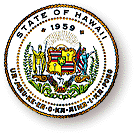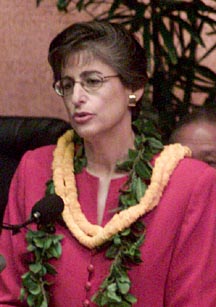
Few surprises likely
in speech by LingleThe gov's address will focus on
education and budget concerns
Unlike her Democratic predecessors who liked to spring at least one headline grabber every year, Republican Gov. Linda Lingle's State of the State address tomorrow isn't expected to generate much in the way of surprises.
STAR-BULLETIN / 2003
Gov. Linda Lingle, shown here during last year's State of the State, will give this year's address on Monday.
During her first year in office, Lingle has been candid and open about what major "common sense" things she wants from the Democratic-controlled Legislature: a restructuring of public education, productive anti-drug programs, $539 million in state construction and tax breaks for the poor.
Her address to a joint session of the House and Senate is scheduled for 10 a.m. and will be carried live on all the major television channels and several radio stations. It will also be available on the governor's Web site.
Being the champion of fiscal restraint, it's unlikely she'll propose any programs requiring major spending increases. She may caution that "looming" binding arbitration awards for 23,000 state workers could bust the budget.
Aside from once again requesting an increase in the state income tax standard deduction to save 18,000 low earners from having to file returns and a long-term care insurance tax credit, Lingle has said she'll recommend another substantial tax break. That's to be one of her surprises .
"There will be one you haven't heard yet and you won't until Monday," she said Friday.
However, in what could be construed as an indirect endorsement of an election-year tax increase, the governor is expected to repeat her "home rule" support for giving the city and county governments added taxing power to raise money for transportation projects, primarily a light rail or monorail system for traffic-jammed Oahu.
That would fly in the face of House Speaker Calvin Say's opening-day declaration on Wednesday that "the House will not approve any measure to raise taxes this year," and Senate Ways and Means Committee Chairman Brian Taniguchi's statement that any tax hike proposal this year would "face an uphill battle."
As she did in her inaugural address a year ago, Lingle will give priority to reforming the state's public education system. She says the current system has left Hawaii students among the poorest achievers in the nation, a claim refuted by the Department of Education and leaders of the Legislature's Democratic majority, although they agree more money needs to get to the classroom.
The governor will again demand that lawmakers put on November's general election ballot a proposed state constitutional amendment to eliminate the elected statewide Board of Education and replace it with seven or more elected district school boards.
No doubt she'll remind Democratic lawmakers that in 2002 they argued for and overwhelmingly supported going to district school boards. That move stalled when House and Senate conferees couldn't agreed on the number of districts.
As for Hawaii's "ice" addiction epidemic, Lingle is expected to ask for $20 million more for drug treatment to be coupled with prevention and tougher law enforcement, including use of the "walk and talk" drug interdiction programs and allowing wiretap evidence obtained in federal investigations to be used in state courts.
The governor will call for the support of Hawaii's business community with priority on adding job training in the community colleges to create the local workforce needed to handle military and civilian housing projects and her own program for repair and maintenance of state facilities.
Other items in her pro-business agenda include a tax incentive for more major health insurers to come to the islands, allowing business groups to negotiate health plans and crack down on workers compensation and insurance fraud.
In other areas, Lingle likely will mention her administration's federal-private partnership for launching a $10 million war this year on alien plant and animal species, support for families of troops deploying to Iraq and Afghanistan and the need to identify and protect prime agriculture lands.

